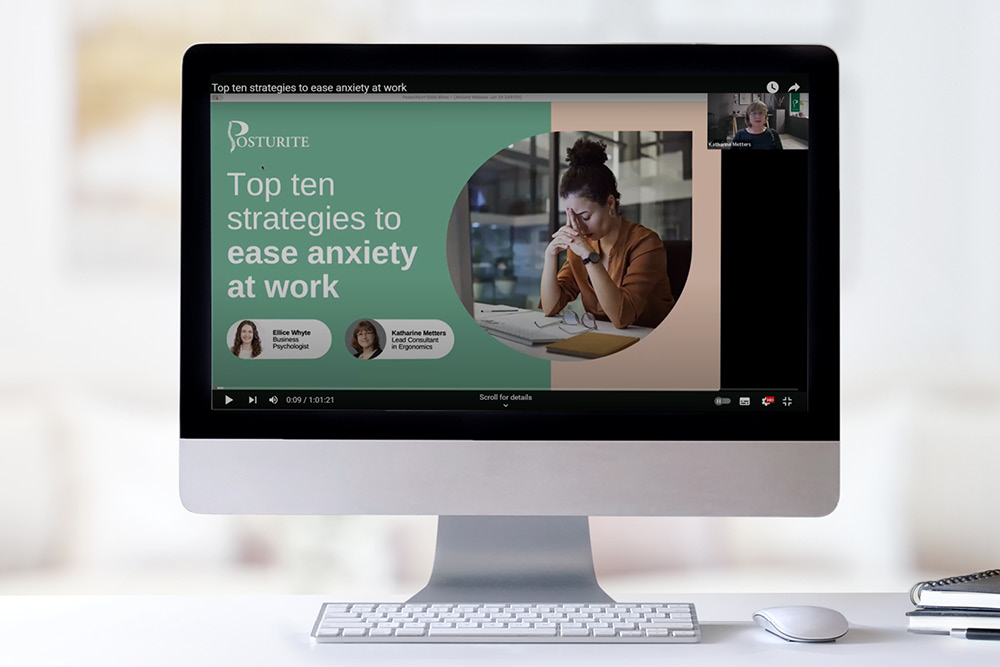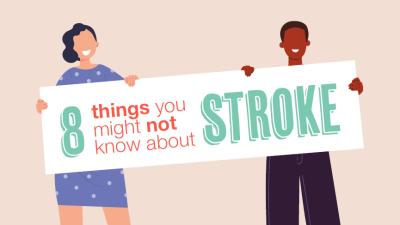
“Anxiety is often characterised by excessive worry or fear” business psychologist Ellice Whyte (pictured above) tells me. “You just have this apprehension that something awful might be around the corner or might happen again. Anxiety is there to keep us safe from danger. And we often physically experience symptoms such as an increased pulse rate, a quickening of breath and trembling. Psychological symptoms as well might be where you feel extremely on edge, and have difficulty sleeping and concentrating. The effects are different for every individual.”
I’m keen to learn more about anxiety at work from Ellice, who is passionate about workplace wellbeing, and uses social scientific research methods to help employees thrive at work and help organisations to minimise the impact of poor mental health on their business.
And the impact is huge. Anxiety, stress and depression accounted for 49% of new and long-standing cases of work-related ill health last year, reports the ONS.

Posturite’s Lead Consultant Katharine Metters adds: “It is absolutely fundamental that we get this right, to be committed to improving employee mental health. Both from a moral perspective, but also to give us all the strategic advantage if we get it right.”
What employer actions can trigger workplace anxiety?
- Impersonal, rude and unclear communication styles.
- Unrealistic expectations.
- Insufficient resources.
- A lack of positive feedback and recognition of effort.
- Insufficient breaks and a company culture where getting away from the desk is discouraged.
- A lack of inclusivity – without opportunities for neurodivergent employees to thrive by adapting work styles.
And what can employers do to reduce these anxiety triggers?

- Use a positive and friendly communication style in emails, messages, on the phone and in person.
- Provide a specific purpose and agenda for meetings, so people come prepared. Avoid a mysterious unspecific meeting title such as ‘Update’ – your team members might feel unnecessarily anxious about whether this meeting will entail criticism of their work or even a risk to their job security.
- Set realistic expectations and break large projects down into attainable small tasks.
- Take care to provide clear information and briefing, as well as sufficient resources and training.
- Recognise effort and achievement, encourage development and address issues.
- Encourage short breaks – to benefit both the body and mind. They won’t hurt productivity – they’ll boost it!
- Welcome employees requesting different ways of working, to support their neurodiversity or unique talents. Be inclusive.
Now watch Ellice Whyte going into more details about these improvements to work culture in the Posturite webinar ‘Top ten strategies to ease anxiety at work’:
What actions can you and your colleagues take to lessen triggers for anxiety at work?
Ellice recommends taking control of anxiety in our breakfast to bedtime routines.
Adopting healthy lifestyle habits help put you back in control:
- Despite the lure of a George Clooney-advertised coffee-fuelled start to the day, caffeine is a stimulant that can aggravate anxiety. Try swapping your cups of tea, coffee, hot chocolate or energy drinks for fresh hydrating water, herbal infusions or juice. They could help you to feel calmer.
- How could you make changes to your commute if you have one? All those aggravations of delays, aggressive driving and noise is a bad start to the working day. To reduce the impact, try to leave plenty of time for the journey. Listen to some music to chill out or put an inspiring or funny podcast on. Is there a different route that takes a little longer but it less crowded or more pleasant? Could you even request different hours to travel outside peak times?
- Once work starts, try getting the worst task out of the way first, so it isn’t constantly on your mind. Get it done and move on!
- To minimise disruptions and improve focus and a calm outlook, you could set aside specific times to check emails or undertake other routine tasks.
- For best productivity, take some short breaks! Change your posture and move. And some exercise at lunchtime can do wonders for reducing anxiety, boosting oxygen intake and releasing tension.
What about after work?

- Be mindful about the kind of media content you're consuming and how that is affecting your mood and psyche. Doomscrolling can be a quick-fire way to trigger anxious feelings. If you’re viewing social media that is making you feel bad about yourself, this of course affects your overall confidence and happiness, including at work.
And here’s a newsflash: if you spend all of your free time watching TV programmes about serial killers with tense, angst-ridden soundtracks, they might not put you in the sunniest disposition. But each to their own I guess…
- Exercise would be a great way to spend some of your spare time – to bump up the production of your brain's endorphins, which are feel-good neurotransmitters. And even better if that’s in nature; “Spending time in nature has been found to help with mental health problems such as anxiety” says the mental health charity Mind.

- Is there a creative hobby you could take up in the evenings, as well as spending time with friends and family?
- Could you reduce your alcohol intake? Remembering that alcohol is a depressant.
- There’s nothing worse than trying to excel in your demanding job if you have had insufficient sleep. Sometimes, there’s little you can do about this (cue loud yell from the tiny person in the Waybuloo onesie). But for others of us, have you tried every variation of recommended bedtime routines to try and increase the hours of sleep your body receives for recovery, repair and recharging? It’s the number one best thing you could do to try to lessen anxiety.
I’d like to point you towards some good NHS advice and resources on anxiety:
- ‘Things you can try to help with anxiety, fear and panic’ written advice from the NHS
- ‘How to cope with anxiety – a relaxation technique’ free NHS mental wellbeing audio guide
Seeking professional help for anxiety
Please do go and discuss your mental health issues with your GP, they can assess whether you might have Generalised Anxiety Disorder (GAD) or another condition and get you the help you need.
Seeking mental health support within your organisation
“It’s okay to not be okay” advises Jean-Marie Delport, a Director in Risk Advisory at Deloitte and also one of their mental health champions.
She continues “I know it’s scary speaking about mental health and speaking about what you are dealing with. It’s okay to feel scared and to be struggling. I’d like to encourage anyone that would like to speak to someone to take that step. You won’t regret it! If you are looking for a sign – this is it!
For me personally, anxiety leaves me feeling overwhelmed and stressed. I am sure others experience it in different ways. But for me, my whole body feels tense and I struggle to think clearly.
Exercise provides a lot of relief for me, but I had to understand the root cause. Therapy has helped me understand why I was feeling this way and I was able to understand the triggers.
I can honestly say that I have been able to overcome my anxiety, and I am now controlling it rather than it controlling me.”
This is heartening to hear from Jean-Marie.
Thank you to Ellice Whyte from Mindset Business Psychology Services for giving me a better insight into anxiety at work and the actions that both employers and employees can take to try to reduce it. She adds that “It's really important that we consider not just ourselves but other people we work with and the influence that our behaviour might have.”
Watch next:











